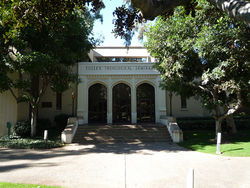 |
| Payton Hall, one of the stately old buildings on the Fuller campus |
My favorite southern California seminary announced this week that it's moving from Pasadena to Pomona--55 miles further east.
Fuller Theological Semnary will be close to the Claremont colleges, including the liberal Claremont Theological School, and not too far from the neighborhood of Azusa Pacific University--a location that will fit its theology as well as its geography.
The photo from 1947 in today's Los Angeles Times reveals much about Fuller's roots.
http://www.latimes.com/business/la-fi-fuller-seminary-20180523-story.html
Four men in grey suits stand together looking at some papers, in front of a stone building being erected. They all have ties and white shirts. Three are grey-haired or balding; a younger man, pointing at the papers (architectural plans?) has dark hair. This is the founding of Fuller Seminary.
One of the men is the evangelist Charles F. Fuller, who at the time hosted the radio show "Old Fashioned Revival Hour."
There are no women in the picture. No women attended the seminary until the mid-1950s, and they were studying to be directors of music or church education, not to become pastors.
A friend of mine, Dr. Margaret Meier, was one of the first women admitted to Fuller. She describes how marginal she and a friend felt on the all-male campus.
Another friend of mine, Dr. Karen Torjesen, was hired as a half-time administrator at Fuller soon after completing her doctorate in early church history. This was in 1985-87. She had been hired because the main line denominations had said: either you deal with your lack of women professors or we will pull our students.
There was only one woman professor at the time, Dr. Roberta Hestenes, who taught Christian Education. By this time there was a Women's Concerns Committee to address the needs of female students, agitating for more women professors and for women's voices in the chapel.
Dr. Torjesen soon showed herself to be too much of an activist for Fuller. She co-wrote an article for the campus newspaper laying out from a Church History perspective the problematic character of the biblical and historical arguments against homosexuality.
Fuller announced that it would not renew her appointment. The Women's Concerns Committee orchestrated student resistance against her dismissal, to no avail.
Dr. Torjesen went on to found a graduate program in Women's Studies in Religion, one of the first in the nation, at Claremont Graduate University. She held an endowed chair funded by investor Margo L. Goldsmith and became chair of the religion department.
Her most well-known book is When Women Were Priests.
Women now earn Masters of Divinity degrees at Fuller and become pastors.
Its move to the distant suburbs of Los Angeles will enable its students and employees to find more affordable housing.
How will Fuller continue to evolve? When will it finally have a woman president and equal numbers of male and female professors?
Its founders did not realize that they had much to learn.
No comments:
Post a Comment